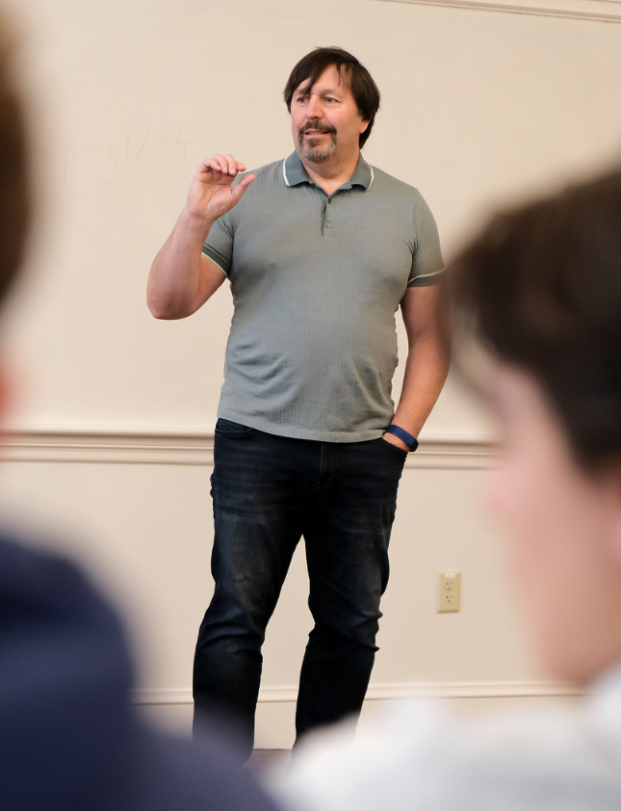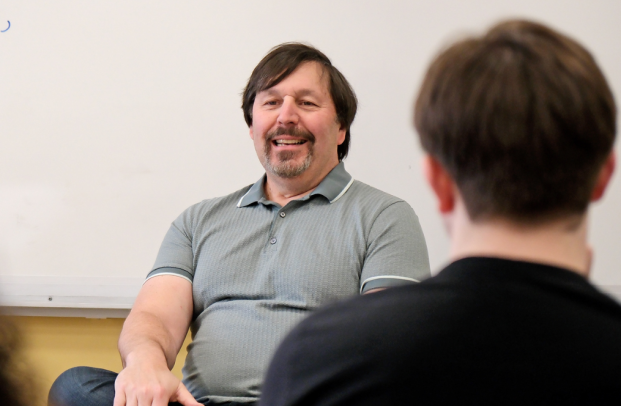Best-selling author R.A. Salvatore ’81, ’91 returned to Fitchburg State this spring for a weeklong appearance as writer-in-residence, meeting with students across disciplines to discuss his life and career, and the lessons he’s learned along the way. Salvatore’s latest book, Pinquickle’s Folly, will be published April 16 by Simon & Schuster.
As writer-in-residence, Salvatore spent a week on campus speaking with students in classes spanning English studies, communications media and game design (see related story). He recounted his days as a fledgling writer and how his time at Fitchburg State helped launch a career spanning nearly 50 titles with millions of books sold. The residency was just the latest engagement Salvatore has shared with the campus, which included delivering the undergraduate commencement address in 2011, as well as a presentation on “The Future of Storytelling” in 2022.
Salvatore grew up in Leominster, the youngest of seven children. He was a commuter student at Fitchburg State, attending classes between early morning shifts at a plastics factory and nights working as a bouncer. For Christmas 1977, a sister gave him a set of books by J.R.R. Tolkien, including The Hobbit and The Lord of the Rings. Salvatore cast them aside without a thought, never fancying himself much of a reader.
The following February, the Blizzard of ‘78 struck, and Salvatore found himself housebound with nothing to watch on TV but incessant coverage of the crippling storm. He picked up The Hobbit and started to read. His world was forever changed.
“I couldn’t put them down,” he said. “All of a sudden this whole world opened up to me.”
Salvatore switched majors to communications media (he’d planned on studying math), and found a previously unknown appetite for the works of Chaucer and Shakespeare and James Joyce.
He also consumed fantasy fiction, but found the genre was limited in those days. “Basically, what your bookstore had is what you could get,” he said.
To fill the void, he took pen to paper - having never been taught to type - to start writing his own novel. He had seen the impact his words had on others while writing for the school paper at Fitchburg State, but he told students that his first foray into novel writing was never meant for other eyes.
“I didn’t write it to get published,” he told students. “The reason I wrote is, this is how I make sense of the world.”
Showing the book to friends and family, however, he was encouraged to seek publication. It was a humbling experience, he recalled to students. “I got some of the most horrible rejection letters you could ever get,” he said. “It just made me angry.”
In July 1987 he was offered the chance to write for a new series of fantasy novels being published by TSR. With two young children and a third on the way, and needing to keep his day job doing inventory and finance for an electronics company, Salvatore faced a daunting deadline that he had to accept. “The opportunity presented itself, and when you get breaks, take them,” he said. “When they happen, you better be ready to jump on them.”
After completing a trilogy of books, Salvatore recalled, his editor told him it was time for him to quit his day job and commit to writing full-time. “That’s how my career started. I didn’t look for it, it found me,” he said. “I quit my day job in 1990 to ‘retire’ as a writer.”
Studying history and culture is critical if you want to build worlds people will care about. The more familiarity you can give to the reader, the more they will be invested in your worlds, whether that’s video games or literature.
That secondary career has endured for decades, including an ongoing series of fantasy novels involving his fan-favorite dark elf character Drizzt Do'Urden. He helped found a video game studio with former Red Sox pitcher Curt Schilling and continues to collaborate with other game enterprises. And he had a memorable foray into the “Star Wars” universe including the novel adaptation of “Attack of the Clones,” for which he got to spend several unforgettable hours collaborating with creator George Lucas.
Sharing his ongoing journey with students, Salvatore cited the importance of research to the creation of believable worlds, even for the exotic fantasy realms in which most of his works are set.
“Studying history and culture is critical if you want to build worlds people will care about,” he said. “The reader has to suspend disbelief. The more familiarity you can give to the reader, the more they will be invested in your worlds, whether that’s video games or literature.”
Recalling his work building worlds for the video game industry, Salvatore said he stressed the importance of grounding the fantasy in realistic terms. He recalled a class at Fitchburg State called “The Ascent of Man,” which itself was inspired by a landmark miniseries that aired on PBS and traced human history through major technological advances.
“I found that course really helpful because when I’m writing and world-building in my genre, world-building is half the game,” Salvatore told students. “You have to make it make sense to the reader, and the way you do that is with logic, and an understanding of history, and why cultures are the way that they are. Is it religion? Is it geography? Is it because they were an oft-conquered people? It changes the psyche of places, it changes the psyche of populations.”
Now, as he continues to explore new modalities for storytelling across genres and forms, Salvatore said writing still serves an essential and personal purpose. “It’s been a good life, and a good journey,” he said. “I got to spend my life doing what I love to do, and I got to watch my kids grow up. And I’m still trying to make sense of the world.”


